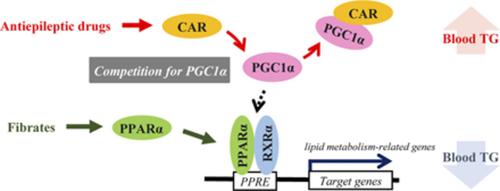当前位置:
X-MOL 学术
›
Mol. Pharmacol.
›
论文详情
Our official English website, www.x-mol.net, welcomes your
feedback! (Note: you will need to create a separate account there.)
Antiepileptic drug-activated constitutive androstane receptor inhibits peroxisome proliferator-activated receptor α- and peroxisome proliferator-activated receptor γ coactivator 1α-dependent gene expression to increase blood triglyceride levels.
Molecular Pharmacology ( IF 3.2 ) Pub Date : 2020-11-01 , DOI: 10.1124/molpharm.120.000103 Ryota Shizu 1 , Yuta Otsuka 2 , Kanako Ezaki 2 , Chizuru Ishii 2 , Shingo Arakawa 2 , Yuto Amaike 2 , Taiki Abe 2 , Takuomi Hosaka 2 , Takamitsu Sasaki 2 , Yuichiro Kanno 2 , Masaaki Miyata 2 , Yasushi Yamazoe 2 , Kouichi Yoshinari 1
Molecular Pharmacology ( IF 3.2 ) Pub Date : 2020-11-01 , DOI: 10.1124/molpharm.120.000103 Ryota Shizu 1 , Yuta Otsuka 2 , Kanako Ezaki 2 , Chizuru Ishii 2 , Shingo Arakawa 2 , Yuto Amaike 2 , Taiki Abe 2 , Takuomi Hosaka 2 , Takamitsu Sasaki 2 , Yuichiro Kanno 2 , Masaaki Miyata 2 , Yasushi Yamazoe 2 , Kouichi Yoshinari 1
Affiliation

|
Long-term administration of some antiepileptic drugs often increases blood lipid levels. In this study, we investigated its molecular mechanism by focusing on the nuclear receptors constitutive active/androstane receptor (CAR) and peroxisome proliferator–activated receptor α (PPARα), which are key transcription factors for enzyme induction and lipid metabolism, respectively, in the liver. Treatment of mice with the CAR activator phenobarbital, an antiepileptic drug, increased plasma triglyceride levels and decreased the hepatic expression of PPARα target genes related to lipid metabolism. The increase in PPARα target gene expression induced by fenofibrate, a PPARα ligand, was inhibited by cotreatment with phenobarbital. CAR suppressed PPARα-dependent gene transcription in HepG2 cells but not in COS-1 cells. The mRNA level of peroxisome proliferator–activated receptor γ coactivator 1α (PGC1α), a coactivator for both CAR and PPARα, in COS-1 cells was much lower than in HepG2 cells. In reporter assays with COS-1 cells overexpressing PGC1α, CAR suppressed PPARα-dependent gene transcription, depending on the coactivator-binding motif. In mammalian two-hybrid assays, CAR attenuated the interaction between PGC1α and PPARα. Chemical inhibition of PGC1α prevented phenobarbital-dependent increases in plasma triglyceride levels and the inhibition of PPARα target gene expression. These results suggest that CAR inhibits the interaction between PPARα and PGC1α, attenuating PPARα-dependent lipid metabolism. This might explain the antiepileptic drug–induced elevation of blood triglyceride levels.
中文翻译:

抗癫痫药激活的组成型雄烷二酸受体抑制过氧化物酶体增殖物激活的受体α和过氧化物酶体增殖物激活的受体γ共激活因子1α依赖性基因表达,以增加血液甘油三酯水平。
长期服用某些抗癫痫药通常会增加血脂水平。在这项研究中,我们通过集中在核受体研究其分子机制组成型活性/雄烷受体(CAR)和过氧化物酶体增殖物激活受体α(PPAR α),它们分别是关键转录因子对酶的诱导和脂质代谢,在肝脏。与CAR活化剂苯巴比妥,抗癫痫药,治疗小鼠增加的血浆甘油三酯水平和降低的PPAR的肝表达α与脂代谢相关的靶基因。在PPAR的增加α由非诺贝特,一种PPAR诱导靶基因表达α与苯巴比妥共抑制抑制配体。CAR抑制PPAR α依赖性基因转录在HepG2细胞中而不是在COS-1细胞。过氧化物酶体增殖物激活受体的mRNA水平γ共激活剂1 α(PGC1 α),一个用于在两轿厢和PPAR共活化剂α,在COS-1细胞中比在HepG2细胞要低得多。与COS-1细胞过度PGC1报道测定α,CAR抑制PPAR α依赖性基因转录,取决于共活化剂结合基序。在哺乳动物双杂交分析,CAR衰减PGC1之间的相互作用α和PPAR α。PGC1的化学抑制α在血浆甘油三酯水平防止苯巴比妥依赖性增加和PPAR的抑制α靶基因表达。这些结果表明,CAR抑制PPAR之间的相互作用α和PGC1 α,衰减PPAR α依赖的脂质代谢。这可能解释了抗癫痫药引起的血液甘油三酯水平升高。
更新日期:2020-10-27
中文翻译:

抗癫痫药激活的组成型雄烷二酸受体抑制过氧化物酶体增殖物激活的受体α和过氧化物酶体增殖物激活的受体γ共激活因子1α依赖性基因表达,以增加血液甘油三酯水平。
长期服用某些抗癫痫药通常会增加血脂水平。在这项研究中,我们通过集中在核受体研究其分子机制组成型活性/雄烷受体(CAR)和过氧化物酶体增殖物激活受体α(PPAR α),它们分别是关键转录因子对酶的诱导和脂质代谢,在肝脏。与CAR活化剂苯巴比妥,抗癫痫药,治疗小鼠增加的血浆甘油三酯水平和降低的PPAR的肝表达α与脂代谢相关的靶基因。在PPAR的增加α由非诺贝特,一种PPAR诱导靶基因表达α与苯巴比妥共抑制抑制配体。CAR抑制PPAR α依赖性基因转录在HepG2细胞中而不是在COS-1细胞。过氧化物酶体增殖物激活受体的mRNA水平γ共激活剂1 α(PGC1 α),一个用于在两轿厢和PPAR共活化剂α,在COS-1细胞中比在HepG2细胞要低得多。与COS-1细胞过度PGC1报道测定α,CAR抑制PPAR α依赖性基因转录,取决于共活化剂结合基序。在哺乳动物双杂交分析,CAR衰减PGC1之间的相互作用α和PPAR α。PGC1的化学抑制α在血浆甘油三酯水平防止苯巴比妥依赖性增加和PPAR的抑制α靶基因表达。这些结果表明,CAR抑制PPAR之间的相互作用α和PGC1 α,衰减PPAR α依赖的脂质代谢。这可能解释了抗癫痫药引起的血液甘油三酯水平升高。











































 京公网安备 11010802027423号
京公网安备 11010802027423号